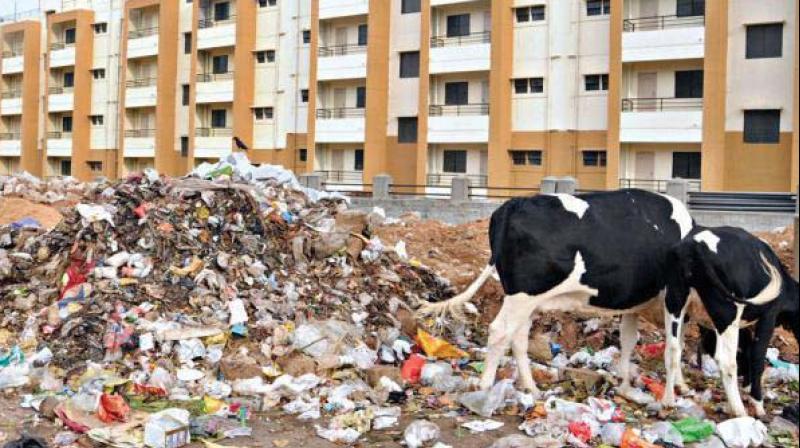Don't talk trash, BBMP: Flats pay a garbage cess too

Solid waste management has always been trouble for the BBMP and the process has largely involved shifting the onus onto residents themselves. BBMP, in its latest bizarre diktat, shuns large complexes. Now, those with 50 flats or more must process and dispose of their own waste. The idea, which was floated and shot down in 2012, has resurfaced. Everyone pays a garbage cess, residents of large complexes included - does the BBMP plan to forgo this, asks Aknisree Karthik
As Bengaluru continues to struggle with its growing mounds of garbage, the BBMP has once again decided to treat large apartment complexes as bulk generators of waste that must dispose of it themselves. Come February and apartment complexes of 50 flats or more will have to process their own garbage as the civic body will no longer lift it.
The idea was first floated six years ago in 2012, but was given up in the face of opposition from the people. While some apartments are currently handing their garbage to empanelled vendors whom they pay anything between Rs 200 to 250 a month, some are handing it over to BBMP contractors employed to pick it up.
But now this luxury of choice will end as the BBMP's latest tender inviting bids from contractors has exempted them from collecting the garbage of bulk generators like the apartment complexes. It’s believed the new rule will impact around 9,000 large apartments in the city. Not surprisingly, they are once again up in arms, particularly as the civic body has not provided them any training or conducted any workshop on how to dispose of their garbage.
Representatives of associations of these apartments point out they like everyone else in Bengaluru pay a solid waste management(SWM) cess to the BBMP and wonder why they are being discriminated against when it comes to garbage disposal.
Says Mr Sadashiva, a representative of an apartment complex in Whitefield, "The BBMP is labelling apartments with 50 flats or more as bulk generators and refusing to collect their garbage when it levies a SWM cess on them like on everyone else . It wants us to either hand over the waste to empanelled vendors or set up composting plants within the apartment complexes.”
He recalls that when the BWSSB made it mandatory for big houses and apartment complexes to have their own sewage treatment plants and install rain water harvesting structures, it introduced a theme park where people could go and choose the model they wished to adopt and learn the procedure involved. “The BWSSB also shares contact numbers of plumbers and the manpower required to do this. But the BBMP has not bothered to conduct any workshop or tell apartment dwellers how they are supposed to dispose their waste,” he regrets.
Mr Sameer, an apartment dweller, also points out that the cost of composting garbage could be high and the people would have to spend from their own funds on this while paying a solid waste management cess of Rs 30 a month. “We will also have to pay Rs 250 a month to the vendors to pick up the garbage,” he complains.
Ask a BBMP officer and he mouths the official line, saying anyone generating more than 10 kgs of wet waste is considered a bulk generator. “By this criteria large apartment complexes fall under the bulk garbage generator category and will have to manage it on their own or pay empanelled vendors to dispose it. Once we complete the tenders for ward-wise garbage collection, we will think of conducting workshops for the apartments in association with NGOs,” he adds vaguely.
No space for compost plants
Although Mayor Gangambike Mallikarjun had promised to take a decision on exempting those disposing their own garbage from paying a solid waste management cess, there is no sign of this as yet. She had also assured that the compost produced by households would be bought by the government, but there hasn’t been any progress on this either, point out apartment dwellers, who are now required to mandatorily compost their wet waste and dispose of their dry garbage as well. “When individual houses convert their wet waste into manure, the quantity is very little. But when apartments of 50 units and more compost their wet waste, the quantity is bound to be huge. We don’t know what we are supposed to do with it,” says Mr Girish, an apartment dweller, demanding that a proper channel be set up by the government to help them sell their compost.
He also points out that space is a big issue in apartment complexes and setting up large composting plants in their grounds could be a problem . “ There is just enough space for parking and a few other activities. Setting up a composting plant could prove difficult,” he adds.

